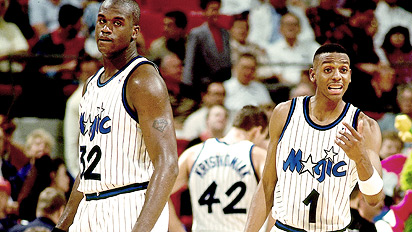Well, it should come as little surprise that parity is a myth, at least in the NBA. Parity, as far as I can tell, can only exist in a vacuum. Since professionalized sports have emerged as a condition of capitalism, the fortunes of the league, as well as the individual teams within the league, are entirely intertwined with exchange and acquisition of capital and assets. There are always exceptions, of course, but it's no secret that money is the primary factor for sustained "success" in professional sports. The main difference, of course, is who you're talking to in relation to the game, and how they define "success." For players and coaches, "success" is winning an championship. However, for an owner, "success" is turning a profit on an expensive investment. Often, these two definitions for "success," especially as they relate to parity, collide in very ugly ways.
The NBA lockout provides us with a recent example of this. During the 2011 Lockout, many of the owners firmly dug in their heels unless there was an assurance that conditions were ratified in the new collective bargaining agreement to ensure that more "parity" could exist between small market and large market owners. Tangibly, the owners suggested a hard salary cap, shorter guaranteed contracts, and more tools to erase contractual mistakes (like the much-discussed "amnesty clause"). And, despite the fact that the owners "won" the lockout, neither history, nor economics, were presumably on the owners' side. David Aldridge pointed out in an October article on NBA.com that in 53 years of NBA basketball, only seven of the league's thirty franchises -- the Boston Celtics, the Minneapolis/Los Angeles Lakers, the San Antonio Spurs, the Philadelphia/Golden State Warriors and the Syracuse/Philadelphia 76ers -- won 80% of the total number of championships. Similarly, Dave Berri of the Wages of Wins Journal argues that it's not a player's salary, or a team's payroll that makes a difference in wins-and-losses, but rather, the franchise's ability to run both a good basketball team and a good business. So, while it is a nice thought to think that a salary cap, or revenue sharing, would create a scenario by which any team would have a chance to win a championship, this is simply not, and never will be, the case. For the owners who locked out the players, this was a reality they had known for a long time. For them, "parity" was being discussed an defined in purely economic terms. For everyone else -- GMs, coaches, players, and fans -- it's still all about winning, and having the shot to win a championship. Unfortunately, as history has shown, the most of the NBA championships have been won by a very small number of teams. Everyone else has been on the outside, looking in.
The Diss has a certain fascination with bad teams. This may not be surprising, given that a number of contributors for The Diss are lifelong fans of the Golden State Warriors and the Minnesota Timberwolves. However, throughout its brief existence, this blog has organically trended towards themes of struggle, decay, ineptitude and eventual rebirth, rather than themes of victory, functionality, dominance and eventual decline. Indeed, it seems as if most of the national media tends to focus on the contenders, as well as the superstars that make them popular. Too often, rebuilding teams are forgotten in favor of their glitzy counterparts, who win games. And, even worse, sometimes, these rebuilding teams are never built, and never put themselves in a realistic position to win a championship. It might be a product of bad management, bad players, bad coaching, or just plain bad luck, but for whatever reason, the Larry O'Brien trophy never comes to town. That some teams never, ever win doesn't surprise me, seeing as how on-court parity just simply cannot exist. It's a shame.
But all is not totally lost for these unfortunate franchises. Sometimes, a promising rookie becomes a star, who sells tickets, and maybe wins some games. Other times, a good coach, and some good talent an chemistry will come together in a winning season, or maybe even a few winning seasons, with some exciting playoff runs to go with them. There are even the times when a prized free agent signs a big contract with the team, promising greatness, but instead delivering plain old okayness. Despite their retrospective bittersweetness, these can still be seen as cherished, albeit brief moments of fortune and happiness for teams that have failed to win The Ship.
So, for the next few weeks, The Diss will chronicle the brightest moments for teams that have never won an NBA championship in their franchise's history. Those teams, in no particular order, are the:
New Jersey Nets
Indiana Pacers
Denver Nuggets
Kansas City/Sacramento Kings
Phoenix Suns
Minnesota Timberwolves
San Diego/Los Angeles Clippers
Cleveland Cavaliers
Charlotte Bobcats
Charlotte/New Orleans Hornets
New Orleans/Utah Jazz
Toronto Raptors
Vancouver/Memphis Grizzlies
Orlando Magic
Too often do championships define "greatness," and as a result, other accomplishments are seen in a far lesser light. By celebrating these brief moments of fortune for unfortunate franchises, we can appreciate their competitiveness, and perhaps better understand how, and why, it all went wrong, and continues to go wrong, year, after year, after year.





This is a great idea. I'm really looking forward to the Charlotte Bobcats. I'm predicting a tie between Emeka Okafor-fever (or, preferably, Oka-fever) and that time they beat the Knicks by 7 on the road in a regular season game.
ReplyDeleteI was thinking of delving deeply into the Primoz Brezec era of Bobcats basketball.
Delete